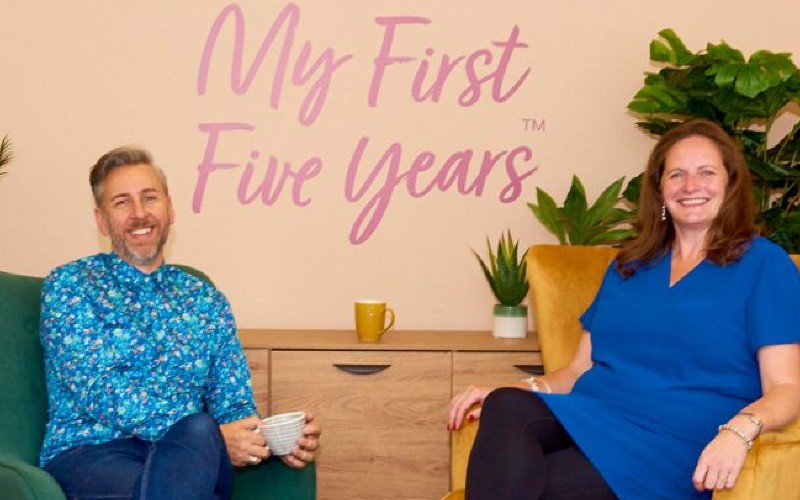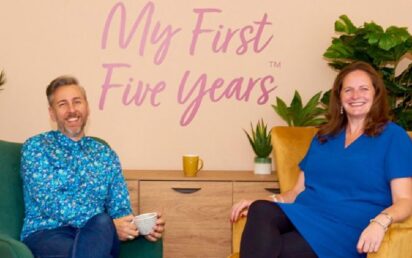The date was January 2020 and Jennie Johnson was done.
The Kids Allowed nursery group that she’d founded in 2003 was sold to Kids Planet for an undisclosed sum.
Johnson had launched the business because she couldn’t find any childcare that ‘wowed’ her after the birth of her second child and had devoted 17 years growing it to eight centres across the North West.
By the time she sold, she was physically and mentally ready for a break.
She bought a lockdown dog called Maple who is now very much part of the family, went on a fitness kick and even bought a motorhome for days out with her family.
Fast forward two years and her planned retirement is on hold.
Her second business – My First Five Years – has just raised £1.4 million and Johnson has rediscovered her mojo.
“It wasn’t that anything went wrong with retirement,” jokes Johnson in an interview with TechBlast. “But I had this idea for My First Five Years and no matter how hard I tried I couldn’t get it out of my mind – the potential positive impact of the app is so much bigger than Kids Allowed.
“I wanted to build something that would support a child’s unique development and give children the best start in life. I sounded out a few people with the idea and they loved it too so I thought ‘let’s do it’ and the rest, as they say, is history.”
She launched the new venture in January 2021 after joining forces with long-term friend and co-founder Alistair Bryce-Clegg.
Today the business has 14 staff with plans to employ even more.
Based at MediaCity in Salford, My First Five Years supports a child’s unique development and received funding from a combination of GMCA and five high net worth individuals.
The £1.4m is in addition to initial funding by the founders followed by a round of £200,000 seed funding in 2021 and followed more than 30 presentations to individuals and companies.
Johnson says: “As any startup founder will know it’s a huge relief to have concluded the funding and I’m incredibly grateful for the support we have received.
“It’s a real sign of confidence in what we’re doing at My First Five years and will enable us to accelerate our growth.
“I’m absolutely convinced that we have a world class idea that will be transformative for parents of young children.
“We’re getting lots of exciting opportunities and can’t wait to get the app launched.”
The app has been designed with support from Manchester digital agency Apadmi and gives parents an understanding of the learning that is taking place and allows them to enjoy their child’s first five years more whilst giving their child a strong foundation for their future learning.
Johnson explains: “The app helps parents see and understand their child’s development, allowing them to marvel in the moments and not just the milestones.”
The startup has identified more than 2,600 skills and activities children may acquire in their first five years and the app works by helping parents support their child’s physical, cognitive and emotional development.
Johnson says: “The feedback we have been getting from our pre-launch test community has been brilliant. The funding will give the product the exposure it requires and continue the next phase of app development.”
More support needed
The entrepreneur has long been a champion of women in business and now wants to see far more support for pre-revenue tech startups.
“It seems to me this very early stage funding is almost entirely done by high net-worth individuals (HNWs), and there’s an institutional funding gap that needs addressing,” she says.
“I worry for first-time around founders, as I have no doubt our previous experience and reputation has helped us open doors and get this round away.
“I think a percentage of any fund should go into the early stage startup ecosystem.”
Johnson also wants to see other changes to the investment ecosystem.
“It’s a chicken and egg situation,” she says. “If the tech founders can also code and develop the app it may be possible to bring a product to market on a shoestring but it becomes much more challenging when you need to pay others to develop out your idea.
“Over the period of the fundraise we gave 13 presentations to companies and 17 to individuals.
“Of the people on the other side of the table, 46 were men and 17 were women. Only two of the companies had any female representation and I think this matters.
VCs need more women
“When you’re pitching tech about educating young children, some of the men visibly switched off. I think for female entrepreneurs to get a fairer share of the cake, especially if the idea they are pitching has a predominantly female customer base, then we need more women on the other side of the table at those meetings. Representation and lived experience matters.
“On the whole the experience was a good one, people followed up when they said they would. One even followed up with three other contacts that he thought were better suited for our early stage. This sort of collaboration is brilliant.
“Getting timely feedback is also important. You’re raising money because you need it and it’s going to run out if you don’t get it so pace of communication is important.
“A quick ‘no’ is much better than a long drawn out one.”
Johnson says she had mixed experiences of dealing with VCs.
“Despite pitching in person in November one is yet to respond at all, despite follow-up from me – surely that’s just rude! I heard another tearing strips off someone on the phone while I was waiting in the reception,” she recalls.
“In addition to the founders we have eight early stage investors and five higher-ticket new investors this time around. The make-up is six women and seven men, and that funding was matched (by an unnamed fund) to support job creation in the region.
“I love the fact that successful business leaders in our region are giving back.
“If we can’t get the UK to do more to support startups, I fear we’ll get left behind.
“For their part VCs might say that the strong ones will rise to the top but sometimes mountains are just too high to climb without better support.”
Johnson says joining the Exchange scheme at Enterprise City – for which Tech Nation is a knowledge partner – has helped to make connections, get support and secure office space in the centre of Manchester for meetings.
Councillor David Molyneux, GMCA lead for Investment and Resources, said: “GMCA was impressed with Jennie’s experience and the way technology was being adapted to improve the lives of parents and young children.
“The continued development of My First Five Years supports the growth of Greater Manchester’s thriving digital economy. The growth of the app will also create a number of new good-quality jobs in the sector for the city region.”


